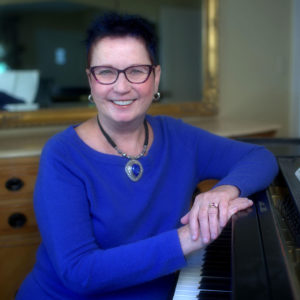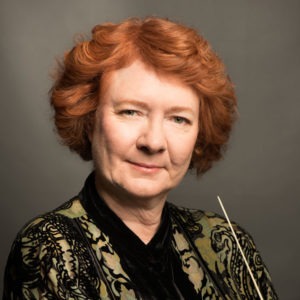Choose Life
Mona Lyn Reese composer
Delores Dufner librettist
San José Chamber Orchestra & Chorus
Barbara Day Turner conductor
Mona Lyn Reese composes with a mission: to confront human experiences, both harrowing and hallowing, with unflinching artistry. Her dramatic oratorio CHOOSE LIFE melds Jewish and Christian musical traditions, Holocaust survivor accounts, and scripture into a powerful interfaith memorial. An immediate success, this work filled 1500-seat auditoriums and received spontaneous standing ovations at every concert during its initial season; and it’s easy to see why.
Reese possesses a rare talent for marrying intricate rhythms and stylistic diversity — klezmer, Gregorian chant, and Anglican anthems — to soaring melodies and emotional depth. Acclaimed nationally and nominated for a Pulitzer Prize, this powerhouse of a work moves listeners to reflect, remember, and ultimately — to CHOOSE LIFE.
Track Listing & Credits
| # | Title | Composer | Performer | |
|---|---|---|---|---|
| 01 | Overture: O Holy One All Wise | Mona Lyn Reese | Delores Dufner, librettist; San José Chamber Orchestra and Chorus | Barbara Day Turner, conductor; Michael Riskin, soprano | 2:46 |
| 02 | Hear Me, My People | Mona Lyn Reese | Delores Dufner, librettist; Layna Chianakas, mezzo-soprano; San José Chamber Orchestra and Chorus | Barbara Day Turner, conductor | 3:38 |
| 03 | Holy One Beyond the Stars | Mona Lyn Reese | Delores Dufner, librettist; Stephen Guggenheim, tenor; San José Chamber Orchestra and Chorus | Barbara Day Turner, conductor | 2:13 |
| 04 | O God of Israel | Mona Lyn Reese | Delores Dufner, librettist; San José Chamber Orchestra and Chorus | Barbara Day Turner, conductor | 1:53 |
| 05 | Reading 1 and Chant Ani Maamin | Mona Lyn Reese | Delores Dufner, librettist; Isabell Monk O'Connor, voice; San José Chamber Orchestra and Chorus | Barbara Day Turner, conductor | 1:56 |
| 06 | A Voice Is Heard in Ramah | Mona Lyn Reese | Delores Dufner, librettist; San José Chamber Orchestra and Chorus | Barbara Day Turner, conductor | 1:26 |
| 07 | The Death of Franz | Mona Lyn Reese | Delores Dufner, librettist; Allison Charney, soprano; San José Chamber Orchestra and Chorus | Barbara Day Turner, conductor | 2:11 |
| 08 | Reading 2 and Chant In Paradisum | Mona Lyn Reese | Delores Dufner, librettist; Isabell Monk O'Connor, voice; San José Chamber Orchestra and Chorus | Barbara Day Turner, conductor | 1:49 |
| 09 | I Was Absent | Mona Lyn Reese | Delores Dufner, librettist; Kevin Nakatani, bass; San José Chamber Orchestra and Chorus | Barbara Day Turner, conductor | 2:48 |
| 10 | Tender God Have Mercy | Mona Lyn Reese | Delores Dufner, librettist; Jordan Bluth, tenor; San José Chamber Orchestra and Chorus | Barbara Day Turner, conductor | 2:41 |
| 11 | Reading 3 and Chant Libera Me | Mona Lyn Reese | Delores Dufner, librettist; Isabell Monk O'Connor, voice; San José Chamber Orchestra and Chorus | Barbara Day Turner, conductor | 2:17 |
| 12 | All Ye Who Pass By | Mona Lyn Reese | Delores Dufner, librettist; San José Chamber Orchestra and Chorus | Barbara Day Turner, conductor | 2:06 |
| 13 | Reading 4 | Mona Lyn Reese | Delores Dufner, librettist; Isabell Monk O'Connor, voice; San José Chamber Orchestra and Chorus | Barbara Day Turner, conductor | 0:49 |
| 14 | Stay With Me, God | Mona Lyn Reese | Delores Dufner, librettist; San José Chamber Orchestra and Chorus | Barbara Day Turner, conductor | 2:25 |
| 15 | How Could I Forget You?: Holy One, You Remained With Me Through Death: You are Precious In My Eyes | Mona Lyn Reese | Delores Dufner, librettist; Layna Chianakas, mezzo-soprano; Stephen Guggenheim, tenor; San José Chamber Orchestra and Chorus | Barbara Day Turner, conductor | 4:54 |
| 16 | Reading 5 | Mona Lyn Reese | Delores Dufner, librettist; Isabell Monk O'Connor, voice; San José Chamber Orchestra and Chorus | Barbara Day Turner, conductor | 0:49 |
| 17 | In Your Likeness | Mona Lyn Reese | Delores Dufner, librettist; Stephen Guggenheim, tenor; San José Chamber Orchestra and Chorus | Barbara Day Turner, conductor | 3:10 |
| 18 | I Will Not Forget: Adonai | Mona Lyn Reese | Delores Dufner, librettist; Stephen Guggenheim, tenor; San José Chamber Orchestra and Chorus | Barbara Day Turner, conductor | 2:26 |
| 19 | Reading 6 | Mona Lyn Reese | Delores Dufner, librettist; Isabell Monk O'Connor, voice; San José Chamber Orchestra and Chorus | Barbara Day Turner, conductor | 0:53 |
| 20 | Choose Life | Mona Lyn Reese | Delores Dufner, librettist; Stephen Guggenheim, tenor; Allison Charney, soprano; Kevin Nakatani, bass; San José Chamber Orchestra and Chorus | Barbara Day Turner, conductor | 3:12 |
| 21 | I Shall Not Die | Mona Lyn Reese | Delores Dufner, librettist; San José Chamber Orchestra and Chorus | Barbara Day Turner, conductor | 2:42 |
Recorded at The Scoring Stage at Skywalker Sound, a Lucasfilm, Ltd. Company Marin County CA
Session Producer Barbara Day Turner, Mona Lyn Reese, Barbara Christmann
Session Engineer Leslie Ann Jones
Assistant Engineer Dann Thompson, Robert Gatley
Editing & Mixing Myron Dove
Mastering Ken Lee
Photography Thomas Hassing
Art Direction Gabriela Martínez, Texto
Cover illustration Choose Life, by Marie Olofsdotter
Choral Preparation Keiko Kagawa-Hamilton
Tune Dona Dona was composed by Sholom Secunda and used with permission of the Harry Fox Agency.
Schola recorded by Rockhouse Productions, St. Joseph MN
Executive Producer Bob Lord
VP of A&R Brandon MacNeil
A&R Danielle Sullivan
VP of Production Jan Košulič
Audio Director Lucas Paquette
VP, Design & Marketing Brett Picknell
Art Director Ryan Harrison
Publicity Chelsea Olaniran
Digital Marketing Manager Brett Iannucci
Artist Information

Mona Lyn Reese
Mona concentrates on opera, orchestra, and choral music. Her work is melodic and accessible with an emphasis on driving or complex rhythms, movement, and contrasting textures. Her music communicates and expresses emotions traditionally or experimentally without allowing a prevailing fashion to dictate style, form, or harmony. Composer-in-Residence at the Minnesota Opera from 1991–1999, she arranged works for the Minnesota Opera touring company and conducted educational residencies to help students write and produce original opera.

Barbara Day Turner
Maestra Barbara Day Turner is the founder and Music Director of the San José Chamber Orchestra. An ardent advocate for new music, she has premiered more than 130 works just with SJCO. Named the 2012 Silicon Valley Arts Council "On Stage" Artist Laureate, Maestra Day Turner is also Music Administrator and Conductor of the Utah Festival Opera and Musical Theater, where she has led critically acclaimed productions of Samuel Barber’s Vanessa, Puccini’s La bohème, Gershwin’s Porgy and Bess, Verdi’s Otello, Rossini’s Barber of Seville, Showboat and Joseph and the Amazing Technicolor Dreamcoat.

Delores Dufner
Delores Dufner, OSB, writes scripturally based hymn and song texts, which have a broad ecumenical appeal and are contracted or licensed by 34 publishers in the United States, Canada, Great Britain, Australia, and China. She has received nearly 50 commissions to write texts for special occasions or needs and has published over 155 hymns. She has authored three hymn collections: Sing a New Church (1994, Oregon Catholic Press), The Glimmer of Glory in Song (2004, GIA Publications), and And Every Breath, a Song (2011, GIA Publications).

